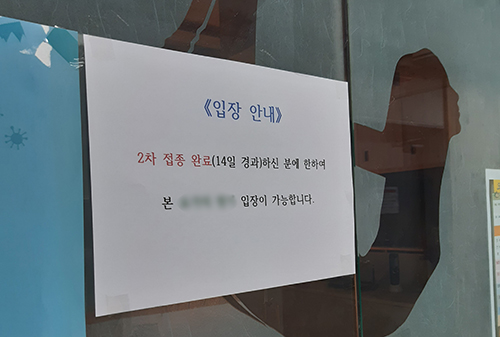 As the vaccine pass system is implemented, unvaccinated people are restricted from entering high-risk facilities without the negative PCR test result. /Photography by Kang Da-hyun |
After 611 days of social distancing, the government’s “Living with COVID-19” policy finally began on November 1st. The policy aims to restore daily life by gradually easing or lifting quarantine measures, and plans to ease the quarantine measures in three stages. The limitation on business hours of all facilities except entertainment facilities has been lifted, and the “vaccine pass” system, which requires a vaccination certificate or a negative COVID-19 Polymerase Chain Reaction (PCR) test certificate depending on the industrial classification, has been introduced. However, the reaction to this vaccine pass system is different. There is a conflict between the opinion that the system is necessary for restoring daily life and the one that it is a system that discriminates against unvaccinated people.
What is the vaccine pass?
The vaccine pass is a system that allows only those who have been vaccinated or those who have tested negative in a PCR test to enter high-risk facilities to minimize the spread of infection. Those who completed vaccination must show an electronic vaccination certificate, while unvaccinated people must show a negative PCR test certificate that reflects the test result within 48 hours. In the case of the first stage of living with COVID-19, the vaccine pass system is applied when visiting high-risk facilities.
Some people welcome the vaccine pass
Some people respond favorably to the vaccine pass system. The first reason is that this system can protect unvaccinated people, who are more vulnerable to COVID-19 than vaccinated ones. On October 28th, the Central Disaster Management Headquarters announced the results of an analysis of the vaccination effect on 43.98 million people aged 18 or older for about seven months, from February 26th to October 2nd, when COVID-19 vaccination began. The result confirmed that unvaccinated people were 9.4 times more likely to die from COVID-19 infection, 22 times more likely to develop serious illness, and 2.7 times more likely to be infected with COVID-19 than those who completed vaccination.
Minimizing the spread of infection is the second reason. Son Young-rae, head of the social strategy group of the Central Disaster Management Headquarters, said in the regular briefing on October 1st that the main idea of the vaccine pass is to block the spread of infection among unvaccinated people and minimize serious illness and death rate. This means that vaccine pass system can prevent unvaccinated people’s infection and vaccinated ones’ breakthrough infections by limiting the activities of the unvaccinated. Lee So-young, the junior of Ewha Women’s University, said that she agrees with the vaccine pass system. “I think gathering only with vaccinated people is much safer than with unvaccinated people, since vaccinated ones are significantly less likely to have the virus.” She added, “Also, since socioeconomic activities cannot be regulated and shut down forever, I think allowing gatherings of vaccinated people is okay.”
The last reason is the revitalization of the economy. According to the “Quarterly Self-employed Loan Status since 2020” provided by the Bank of Korea, the number of loans by self-employed people in the first quarter of 2021 increased 18.8% year-on-year to 831.8 trillion won. Those who support the vaccine pass expect that the economy will recover as they can return to the pre-COVID-19 state.
Vaccine pass also has disadvantages
Although the vaccine pass seems reasonable, some people disagree with it. The first problem is that the vaccine pass system can violate fundamental human rights. Since the vaccine pass system restricts the activities of unvaccinated people, it violates their right such as the right to choose vaccination, pursue safety, act freely, and not to be discriminated against.
Opponents of the vaccine pass also point out the safety of the vaccine. According to the Korea Disease Control and Prevention Agency (KDCA), on October 19th, 1,110 cases of death were reported after being vaccinated against COVID-19, and 12,046 cases of severe side effects, including serious adverse reactions such as anaphylaxis, were reported. The Vaccination Damage Investigation Team deliberated on the causality between reported cases of side effects and vaccines through 33 meetings until October 8th. As a result, two out of 777 reported cases of death, five out of 9,995 cases of severe adverse reactions, and 392 out of 1,094 cases of anaphylaxis were recognized for causality. Although few of the total reported cases have been recognized for causality, some people raise concerns about the safety of vaccines due to the severity of adverse cases with recognized causality and unrecognized but doubtful cases.
The last problem is that it can create a conflict between the vaccinated and the unvaccinated. On September 13th, Consumer News and Business Channel (CNBC) reported that United States (US) companies are struggling with vaccination issues among employees. According to the survey result in the report, 37% of surveyed companies show that vaccinated employees are angry and frustrated at the risk of infection by unvaccinated people, and 21% show that unvaccinated employees complained about the burden of the harsh judgments of other co-workers and requirements of regular COVID-19 inspections. Opponents of the vaccine pass think that expanding the vaccine pass system will intensify the division and conflict between the vaccinated and unvaccinated people.
The vaccine pass system is necessary for the safety of everyone. Still, it is also a discriminatory policy because it restricts the rights of unvaccinated people. Since the vaccine pass system has ambivalence, rather than unconditionally criticizing, it is necessary to understand each other’s positions and operate a vaccine pass system in a way that neither side suffers excessive damage.

